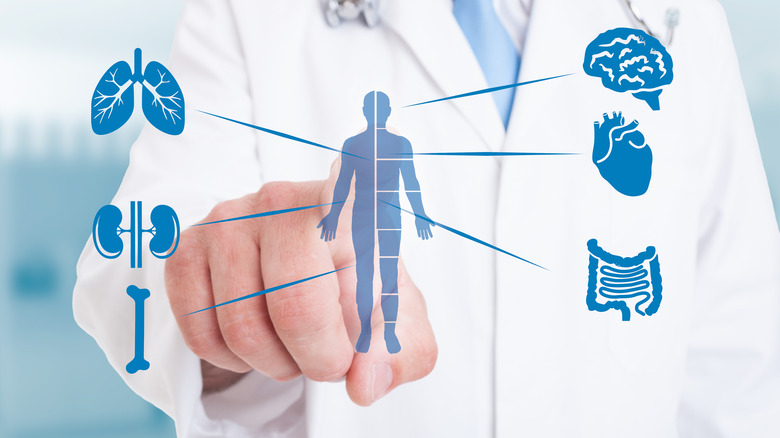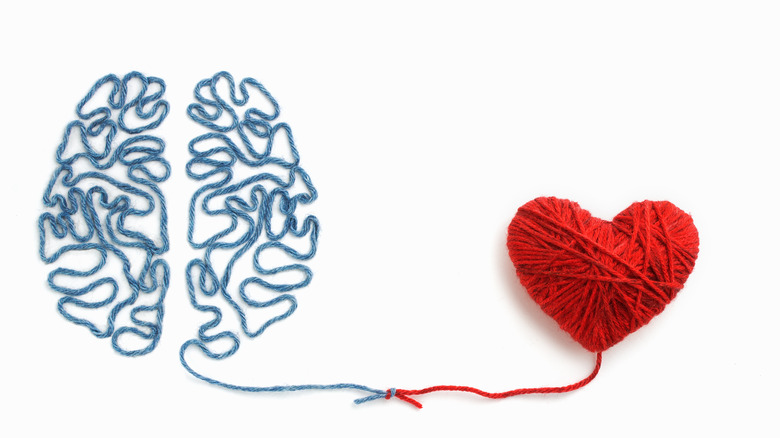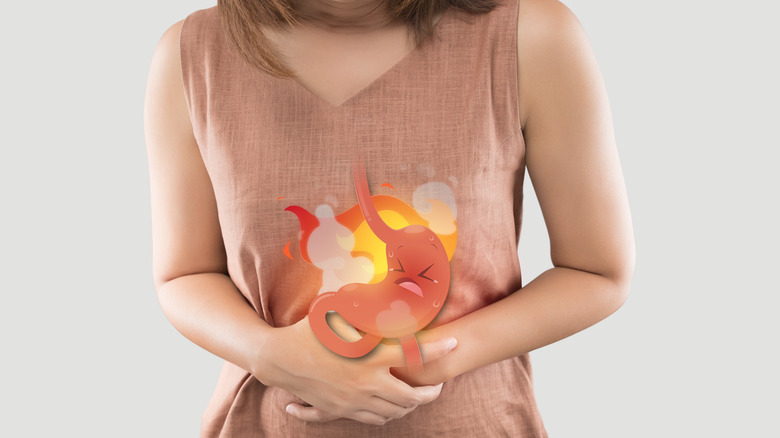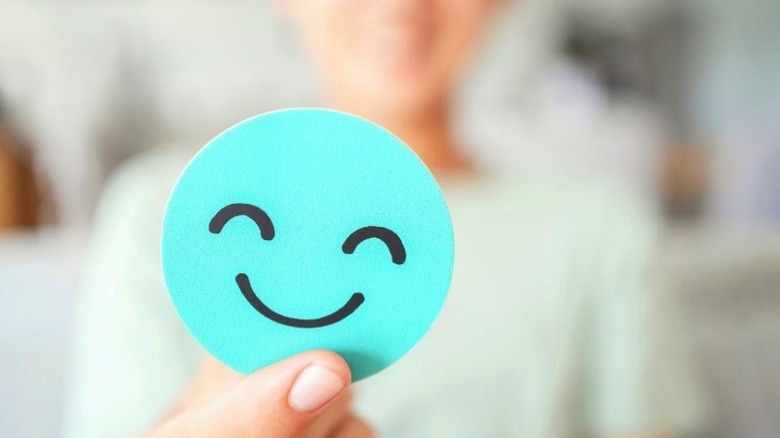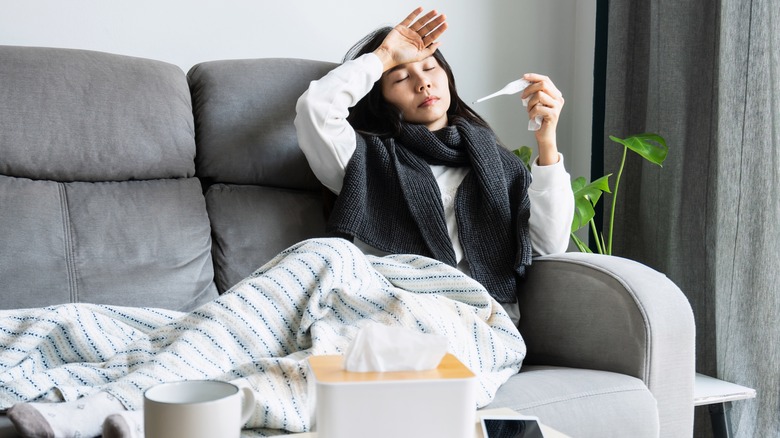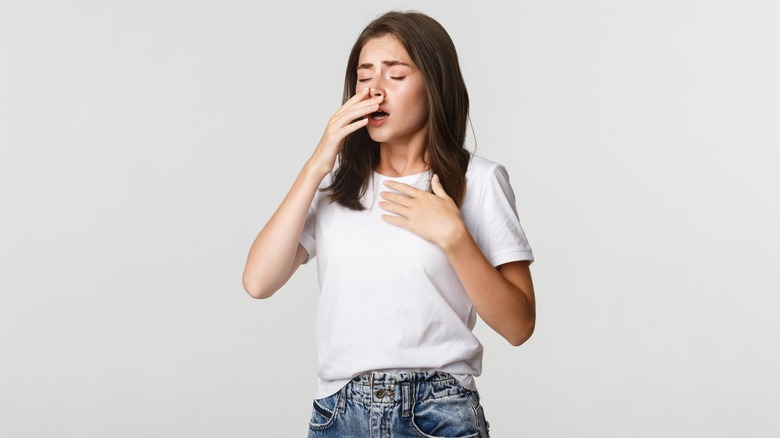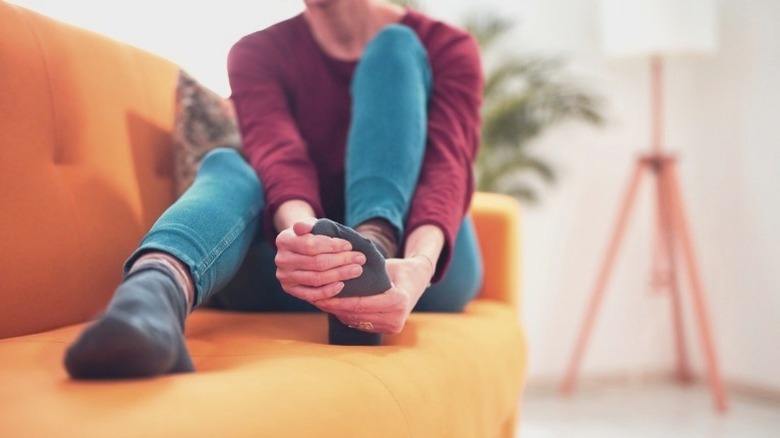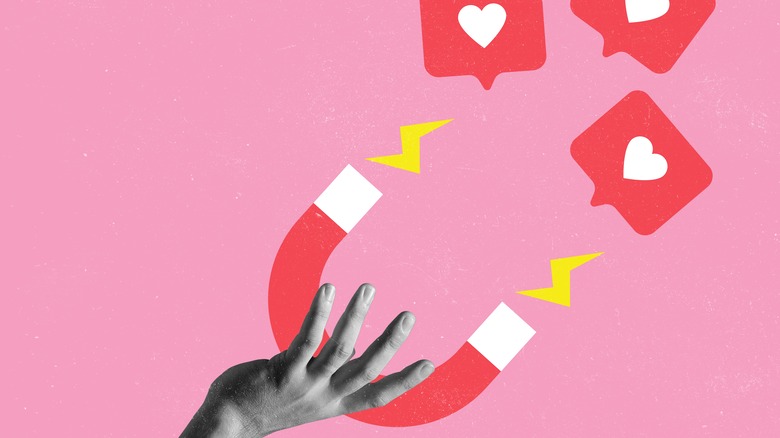Things About Bodily Functions You Might Not Know
No matter how old you are, at some point or another you've probably questioned why your body does what it does. Why do we sneeze, laugh, dream, and cry? The National Cancer Institute defines body functions as "... the physiological or psychological functions of body systems." Body functions are our cells' way of maintaining a state of balance called homeostasis. Homeostasis ensures that there is never too little or too much of something in the body, because even small fluctuations, such as higher blood sugar or blood acidity than normal, can have devastating, even lethal consequences. It is all about staying constant, or staying as close to the same as possible. Many if not all of our body functions are aimed at maintaining homeostasis.
From dreaming to shivering, we will explore what is currently known about some of our most curious bodily functions. Some functions like shivering or sneezing, scientists mostly understand. Other functions like sleeping and dreaming are more complicated and remain mysterious, but there are several interesting theories behind them, so get ready to explore your body's most peculiar functions; you are bound to learn something surprising.
Sleeping cleans the brain
Have you ever wondered why you sleep? The answer may be that our bodies need to replenish adenosine, a compound made by the brain, according to the Sleep Foundation. The increase in fatigue that tends to occur throughout the day is due to fluctuating adenosine levels. At our peak hours, when we feel most awake, adenosine levels are at their lowest, but as we get closer to the evening hours, adenosine rises sharply, corresponding with a feeling of sleepiness. In fact, the reason why a cup of java helps boost energy levels is directly related to its effects on adenosine, according to The Journal of Neuroscience – the caffeine in coffee (and other foods and beverages) acts as an "adenosine antagonist," blocking the effects of adenosine and making you feel more energized.
Another function of sleep is to "clean out" the brain. Dr. Maiken Nedergaard and her colleagues at the University of Rochester recently discovered a system in the brain called the glymphatic system. It involves specialized immune cells and lymphatic vessels that usher toxins out of the brain, making it something of the brain's personal cleanup crew per the NIH. It is most active at night when we are sleeping. Dr. Maiken's team even noted that the glymphatic system helps remove beta amyloid plaques from the brain, one of the primary hallmarks of Alzheimer's Disease, so a lack of sleep may indeed be connected with disease risk.
Laughter cements social bonds and relieves stress
Laughter is contagious. That is what everyone says, but is it true? The philosopher John Morreal thinks that human laughter had important evolutionary origins, according to HowStuffWorks. He felt laughter was meant to be a shared form of relief when a perceived danger or threat had finally passed. Laughter also puts the brakes on the body's fight-or-flight response, boosting levels of trust with others. Indeed, according to the cultural anthropologist Mahadev Apte, "Laughter occurs when people are comfortable with one another, when they feel open and free. And the more laughter [there is], the more bonding [occurs] within the group" (via HowStuffWorks).
The act of laughing itself increases our intake of oxygen, working the muscles, heart, and lungs, according to the Mayo Clinic. It also increases endorphins, the body's natural feel-good and pain-relieving chemicals. Long-term, laughter can boost the immune system, reduce pain, and improve mood, making it easier to deal with life's challenges. All the more reason to share a night of giggles with friends!
Crying releases endorphins
We know that strong emotions make some people cry, but have you ever wondered why this is? What purpose does crying serve? Well, it turns out there is more than one reason we cry, according to WebMD. Some tears help maintain eye health — these include the basal tears that keep the eyeballs lubricated, and the tears that help to expel irritants that find their way into the eye. But the type of tears caused by strong feelings are deemed "emotional tears," which communicate to others that we are sad, in pain, or experiencing some other very strong emotion, including joy.
Similar to laughter, emotional crying is felt to be a way to connect humans to one another, garnering empathy and understanding at a time when we feel most vulnerable. Before we learn to speak, we first communicate to our caregivers that something is wrong through crying. This method remains with us, even once we've learned to communicate in other ways, because it is such a powerful cue. Crying is also good for the person crying — we are quite literally releasing pain when we cry, evidenced by the higher composition of stress hormones and natural painkillers contained in emotional tears.
Crying can be healthy, but even too much of a good thing may signal a problem. If you find yourself crying more than you would like, or if you are experiencing signs of depression such as feeling hopeless, helpless, or losing interest in activities you used to enjoy, you should speak with your doctor or a mental health professional.
You remember what you feel most
According to Psychology Today, emotion serves as a tool to enhance our memories, improving our ability to remember situations that have higher relevance to our survival and wellbeing. Forming a memory involves first taking in the information, processing and storing said information, and then finally retrieving it later on. Emotion acts on all phases of the memory formation process. Emotionally-charged events (both positive and negative) are more likely to be stored than neutral events. Stress hormones like cortisol and adrenaline enhance our ability to consolidate memories so that we remember situations that are dangerous with an added clarity in order to dodge them at a future time. So, what we feel in our figurative hearts affects what we remember with our minds.
Interestingly, our present mood can even affect what we do or don't recall. There is research showing that when we feel more joyful, we are more likely to recall positive memories, and vice versa. Indeed, according to a 2017 study out of Clinical Psychological Science, there is even evidence to suggest that the pain reliever acetaminophen (Tylenol) may not only curb physical pain, but may curb emotional pain as well (via Healthline). In fact, it may even help to dampen the heightened emotional response in people living with Borderline Personality Disorder (BPD).
Vomiting expels toxins from your body
Few are thrilled about the prospect of vomiting, but vomiting serves an important purpose. According to the Cleveland Clinic, vomiting is an unconscious reflex managed by the brain in response to ingested toxins. The immune system and nervous system work in concert to trigger this reflex once they detect the presence of pathogens such as bacteria or viruses, or other potentially harmful substances like drugs or alcohol. Of course, other conditions such as pregnancy or vertigo can trigger vomiting as well.
Simply put, vomiting is often the body's way of getting something harmful out of our system, but too much vomiting can lead to dehydration and may signal serious illness so you should always talk to your doctor if you are vomiting. In the meantime, the Cleveland Clinic suggests you pause on eating for a few hours after vomiting, and take only little drinks of water periodically to avoid overwhelming your sensitive stomach. Focus on clear liquids after this period: ginger ale, water-based broth, water, etc. When you feel up to eating again, opt for bland foods such as toast, bananas, and crackers that are not spicy or strong in flavor. Avoid caffeinated and sugary beverages, which may worsen vomiting and cause dehydration.
Do speak with your doctor before taking any over-the-counter anti-vomiting/nausea medications, such as Pepto-Bismol, as they may cause more harm depending on the reason you are vomiting. Also, some anti-vomiting medications must be avoiding in children and pregnant women, per GoodRx Health.
Smiling makes you happier
Did you know that the act of smiling alone makes you feel happier? According to SCL Health, smiling releases endorphins, those feel-good molecules that make you feel happier. Smiling also releases dopamine, serotonin, and small molecules known as neuropeptides that help reduce stress. In fact, a 2012 study published in Psychological Science even showed that smiling helps to reduce resting heart rate, a sign that the body is recovering from stress and entering a state of relaxation (via Association for Psychological Science). Reduced heart rate is also a marker of cardiovascular health, so smiling could literally benefit your heart. Even more incredibly, there is evidence showing that even faking a smile or smiling even if you don't feel happy, can improve your mood and make you feel happier.
We are also rewarded when other people smile. Seeing someone else smile activates the reward system in our brain according to a 2010 Swedish study in Journal of Nonverbal Behavior, which could also explain why we can't help but to smile back when someone smiles at us — it's a feedback loop of contagious happiness. And beyond the feel-good benefits, smiling may even improve your job performance, according to research conducted by a team of economists at Warwick Business School. Happy people work about 12% harder, according to the study.
Fevers help to fight infection
No one enjoys having a fever, but there is a reason why your body cranks up the heat dial when you are sick. According to Medline Plus, a fever is the body's effort to kill viruses or bacteria that are causing an infection. Since most viruses and pathogens thrive at the body's normal temperature of 98.6 degrees Fahrenheit, an elevated body temperature can help kill these dangerous pathogens. Fever also communicates to your immune system that something has invaded, mobilizing white blood cells into action.
If you have a low-grade fever (lower than 102 degrees Fahrenheit in adults), the Mayo Clinic recommends getting plenty of rest, staying hydrated, and keeping yourself cool (as long as you're not shivering). Over-the-counter fever reducers might be recommended by your doctor — just be sure to follow the instructions on the label. For a fever 103 degrees Fahrenheit or above in adults, speak with a healthcare provider. It is important to seek emergency medical care right away if a high temperature is combined with other symptoms such as rash, confusion, or vomiting, as this can be dangerous and put you at risk for serious complications.
Sneezing expels inhaled contaminants
We all know that familiar tickle in the nose when we're about to let loose a spray of snot, but have you ever wondered why exactly you sneeze? According to Healthline, sneezing happens when a foreign particle — such as smoke, mold, dander, or a pathogen — enters the nose and stimulates a response from the hairs and sensitive skin within. This triggers an electrical signal to be sent to the brain, preparing your body to sneeze. The sneeze itself then expels water, mucous, air, and hopefully the irritant from your nose. And sneezes have force behind them, which is why you should never try to hold it back. Mucus droplets are propelled out of the nose at a speed of up to 100 mph, enough to rupture an eardrum if held in, according to Healthline.
Now here's a fun fact: some people also sneeze in response to sunlight due to a genetic mutation, according to Scientific American. This reflex — the "photic sneeze reflex," or PSR — occurs in about 18-35% of people. People with it often find themselves sneezing when entering direct sunlight after being in an environment with low lighting.
Compressed nerves makes your foot sleepy
Everyone knows that familiar tingly pins-and-needles feeling, when you've sat in one place for too long or in a weird position, and your foot "falls asleep." This occasional minor nuisance is perfectly normal in most cases and is actually a result of nerve compression, according to Healthline. When the foot nerve is irritated or compressed, the connection between the brain and the nerves is temporarily cut off. Fortunately, the connection between the nerves and brain is quickly restored once you get up or change positions.
Of course, if you notice your foot falling asleep frequently, particularly if it happens at other times than those mentioned, you should speak with your doctor. Other medical conditions can lead to a sleepy foot, such as diabetes, multiple sclerosis, and some types of cancers.
There are multiple ways to wake your foot up, such as simply getting up and walking around, changing positions, or doing an ankle roll where you flex the affected ankle forward and backward and then from side to side. This is usually enough to get the sensation back in your foot again.
Shivering makes you warmer
On chilly days spent outside in the cold, you quickly start to shiver. Your muscles contract and your teeth chatter, but why? It turns out that shivering is the body's way of warming itself. Since we need to maintain a temperature at or close to 98.6 degrees Fahrenheit to stay healthy and prevent hypothermia, our brain tracks our body heat levels to ensure that we stay warm under cold conditions, according to NYC-based emergency physician Dr. Robert Glatter, per Live Science.
The hypothalamus is a small structure located deep within the brain that monitors many bodily functions such as hunger, thirst, sleep, and body temperature, ensuring they remain in balance. When nerves at the surface of the skin relay signs of chilliness to the hypothalamus, it induces that familiar, uncontrollable contraction in our muscles known as shivering. Since muscle contractions release energy in the form of motion and heat, the heat energy can be a way to warm the body.
Other conditions unrelated to feeling cold — such as low blood sugar, or a spike in adrenaline – can also cause shivering. So if you are shivering for unexplained reasons, speak with your doctor.
Earwax keeps your ears clean
Most of us don't think much about earwax, but earwax serves an important role for our health. According to the Cleveland Clinic, earwax, also known as cerumen, has important antimicrobial properties, helping to prevent infections and also acting to lubricate the ear. Earwax also traps dirt, dust, bugs, or anything else that might find itself inside your ear, preventing it from traveling further (via Nemours KidsHealth).
Too much earwax can lead to issues such as tinnitus (ringing in the ears) or even hearing loss, but earwax should never be removed with utensils such as cotton swabs or Q-tips, as that can damage the fragile, inner ear (via Cleveland Clinic). The ear is a "self-cleaning" organ, and so usually the older earwax moves out of the ear naturally on its own. If you have a problem with earwax buildup, see a doctor who can remove it safely with medicines placed in the ear (per Nemours KidsHealth).
The hair down there traps germs and (maybe) pheromones
Whether or not you choose to remove it or keep it is your personal choice, but the hair in your nether regions does technically serve a purpose. According to Healthline, pubic hair helps to trap dirt and germs, preventing them from entering the genitals. It also provides warmth, similar to hair on other parts of the body. The pubic hair follicles produce sebum, an oily substance with antimicrobial properties. Lastly, because the skin in the genital region is thin and sensitive, pubic hair protects it from friction during activities that might lead to damage, such as sexual intercourse.
Beyond these functions, pubic hair may be a sign of sexual maturity, since it first appears during the pubescent years. Some scientists theorize that pubic hair might help to trap pheromones, which are scent-bearing chemicals secreted by the apocrine sweat glands found in the pubic region. It is thought that this may help attract a potential mate.

